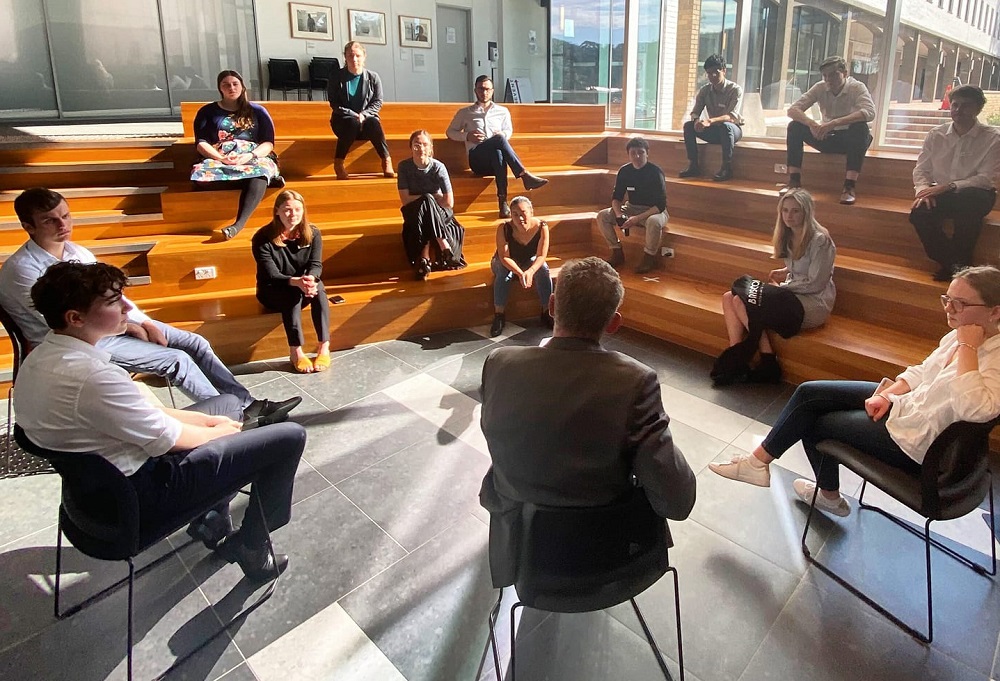
Regardless of the discipline, graduates entering the national security sphere are likely to have far more experience in evaluating policy on paper than in developing novel solutions under pressure. As failures or miscalculations in national security can have drastic consequences, gaining practical experience is essential. Building better practitioners requires that training in high-pressure, hands-on scenarios be pursued as early and as often as possible.
In recent years, crisis simulation has experienced a renaissance as militaries and governments alike employ simulation and war-gaming to train teams and improve coordination.
Crisis simulations build on war-gaming exercises but incorporate both diplomatic and security perspectives. Historically used to analyse
emerging issues, crisis simulation is a well-established technique to prepare, train and drill security professionals. The value of simulations is
considerable, particularly now when graduates are entering into a more dynamic threat environment than at any time since the end of the Cold War.
The crisis renaissance is notable for its visibility. Australia’s Department of Human Services has run
interdepartmental cyber war games for the past three years. State governments in Australia continue to look to crisis simulations to better prepare for real-world crises,
such as the 2019–20 bushfires. The RAND Corporation recently released
Hedgemony, a boxed version of the war games run for US defence professionals, while the Center for a New American Society recently launched its
Gaming Lab, focusing on innovative, unclassified games to assist policymakers in gaining insights into an ever more complex threat environment.
All of these initiatives combine a hybrid professional and academic approach with increasingly accessible media and the growing popularity of gaming as a pastime. Replete with opportunities to navigate stakeholder relationships and respond to challenging, dynamic threat environments, crisis simulations develop the creativity and networking skills necessary to navigate an increasingly complex world, all in a controlled environment.
Building better graduates and early-career practitioners requires simulation activities to be extended to undergraduate students. Opportunities for practical experience in national security are rare and highly competitive. While Model UN competitions offer some hands-on experience, crisis simulations go further by empowering students to apply their learning to novel scenarios and hone crucial soft skills: teamwork, communication and decision-making. Simulations at university level have been conducted in other countries, such as the
National Security Crisis Law Simulation run by Georgetown University, but until 2020 had not made any appearances in Australia.
In September 2020, the inaugural
Australian Crisis Simulation Summit provided the
first such opportunity in Australia for 70 aspiring national security professionals to take part in intense, realistic simulations. This five-day event, incorporating three simulated crises reflecting the inevitable security challenges of the 21st century, was run by the Australian National University and supported by the
departments of Defence, Home Affairs, and Foreign Affairs and Trade, among others. The simulations themselves were powered by
Conducttr, the same software used by NATO and the UK’s Foreign and Commonwealth Office.
As delegates, we experienced first-hand both the value of simulations for practitioners and the logic behind the crisis simulation renaissance. That value depended on three key pillars: building soft skills, learning to accommodate interdisciplinarity and jettison ego, and moving from theory to practice.
The summit was primarily an exercise in negotiation—between actors, across issues and under pressure. We quickly learned to contend with information scarcity and overload, make reasoned decisions and consider the consequences of those decisions. Delegates faced the additional challenge of maintaining composure amid crisis conditions. Teams had to take responsibility for their jurisdictions, navigate efficient task allocation and communicate effectively.
In a competitive job market, ‘imposter syndrome’ can be crippling. For students and recent graduates lacking hands-on experience, committing to a role and its requisite responsibilities proved a useful exercise in fostering confidence. Delegates also learned about their own abilities and leadership styles, enhancing teamwork and forcing adaptation.
The summit also made evident
the benefits of interdisciplinary team composition in national security—participants came from backgrounds as diverse as economics, media and communications, international relations, and the sciences. Casting a wide intellectual net can facilitate creative and inventive policy solutions. However, communicating and coordinating across those disciplines to produce a coherent strategy can be challenging. Overcoming those difficulties required that ego be set aside. Once delegates realised they were on the same team, they acted as such. With no winners or losers, delegates were united in their aims and their understanding of the national interest, and an initially competitive environment transformed into a collegial and cooperative one.
Finally, initiatives like this have direct implications for
professional development in a field in which hands-on experience is essential. Simulations diversify the standard pedagogic diet of essay-writing, increasing students’ and graduates’ capacity to apply their knowledge. Gaining hands-on experience also provides opportunities to discover and engage with new areas of professional interest, further expanding upon knowledge cultivated at work or during study. In our experience, being granted some agency to formulate policy, rather than reading and writing about it, was extremely liberating.
So, what does a model for training future national security professionals look like? Crisis simulations must be at the core.
Simulations expose practitioners to the challenges of working under immense pressure to secure Australia’s unique geostrategic environment, all within a controlled space. Honing that edge will be critical to ensuring that Australia maintains its strategic edge in an increasingly complex world. Harnessing the crisis simulation renaissance is the perfect way to achieve that.
Simulations are the ultimate equaliser—and, in a post-pandemic job market, practical experience for graduates will be more valuable than ever.
[11] departments of Defence, Home Affairs, and Foreign Affairs and Trade, among others: https://australian-crisis-simulation-summit.com/partners/
 Print This Post
Print This Post